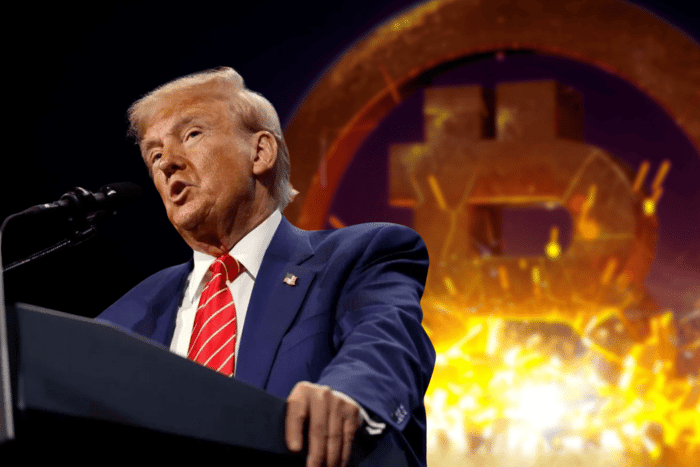Trump’s 2025 Tariff Offensive: A Potential Market Downturn – A Cautionary Tale for Bitcoin Traders
The global economic landscape has been undergoing significant changes in recent years, with geopolitical tensions and trade disputes taking center stage. One figure at the helm of these turbulent waters is Donald Trump, the 45th President of the United States. Known for his protectionist trade policies, Trump’s administration has imposed numerous tariffs on imports from various countries, most notably China. While some argue that these measures are essential for safeguarding American industries and jobs, others warn of potential negative consequences.
A Flashback to the Smoot-Hawley Tariff Act of 1930
To understand the potential ramifications of Trump’s tariff offensive, it is worth exploring a historical precedent: the Smoot-Hawley Tariff Act of 1930. This landmark legislation, enacted during the Great Depression, raised tariffs on over 20,000 imported goods by an average of 50%. The goal was to protect American industries and create jobs, but the unintended consequences were far-reaching.
Global Economic Consequences
The Smoot-Hawley Tariff Act precipitated a global economic downturn, as other countries retaliated with their own tariffs. International trade plummeted, and global economic output declined by approximately 15%. Unemployment soared, and the world teetered on the brink of another Great Depression.
Impact on Bitcoin and Other Markets
Given this historical precedent, what does the future hold for Bitcoin and other markets in the face of Trump’s tariff offensive, which is set to escalate in 2025?
- Increased Volatility: As uncertainty grows regarding the global economic landscape, investors may become more risk-averse, resulting in increased volatility in Bitcoin and other markets.
- Decreased Liquidity: In times of economic turmoil, investors may opt to hold cash or other safe-haven assets, reducing the overall liquidity in the market and potentially leading to decreased demand for Bitcoin.
- Reduced Confidence: The potential for a global economic downturn may lead to reduced confidence in the financial system, causing investors to seek alternative stores of value such as Bitcoin.
Personal Implications
As an individual investor, what can you do to prepare for the potential market downturn that may result from Trump’s tariff offensive? Here are some suggestions:
- Diversify Your Portfolio: Spreading your investments across various asset classes can help mitigate the risk of losses in any one sector.
- Stay Informed: Keeping abreast of global economic developments and market trends can help you make informed investment decisions.
- Consider Alternative Investments: Bitcoin and other cryptocurrencies could serve as potential hedges against inflation and economic instability.
A Global Impact
The potential consequences of Trump’s tariff offensive extend far beyond the realm of Bitcoin and other markets. Economies around the world could face reduced trade, increased unemployment, and decreased economic output. The International Monetary Fund (IMF) has warned that a global trade war could lead to a loss of up to $1 trillion in global output by 2020.
In conclusion, Trump’s tariff offensive, which is set to escalate in 2025, may replay the Smoot-Hawley crisis of 1930. Bitcoin traders and investors should brace themselves for potential market downturns, increased volatility, and reduced liquidity. As individuals, it is crucial to stay informed, diversify our portfolios, and consider alternative investments. The global implications of this trade dispute are far-reaching, and we must remain vigilant in the face of these economic challenges.
Sources:
1. “The Smoot-Hawley Tariff Act of 1930: Background and Impact.” Congressional Research Service, Congressional Research Service, 10 Mar. 2019, https://fas.org/sgp/crs/row/R45761.pdf
2. “Trump’s Tariffs: What’s at Stake.” International Monetary Fund, International Monetary Fund, 27 Mar. 2018, https://www.imf.org/en/News/Articles/2018/03/27/trumps-tariffs-whats-at-stake





